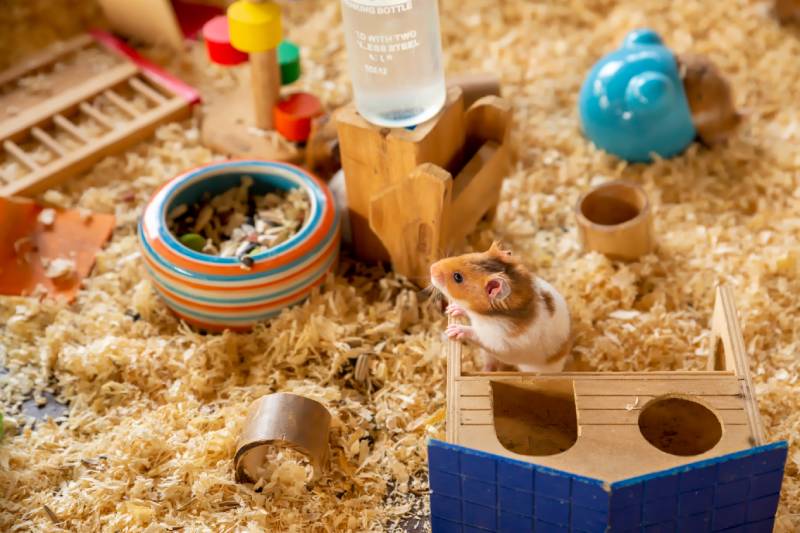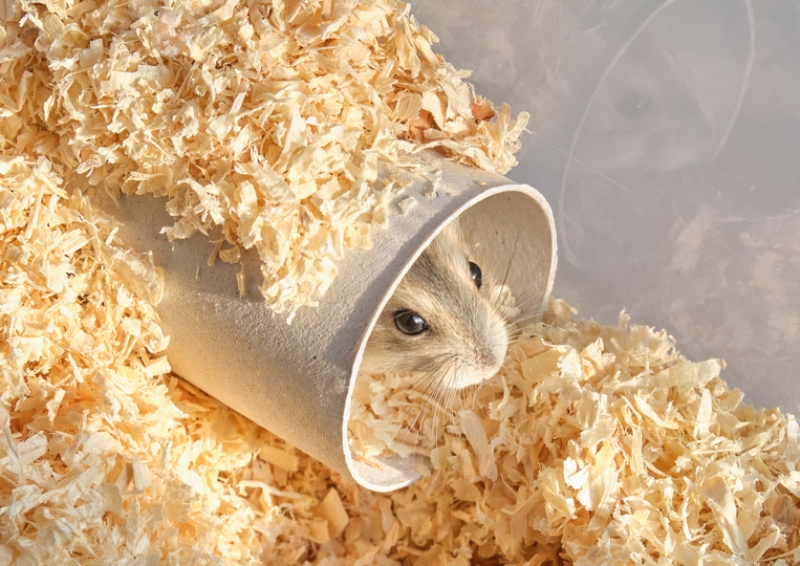Can Hamsters Eat Cashews? Vet Approved Facts & FAQ
Updated on
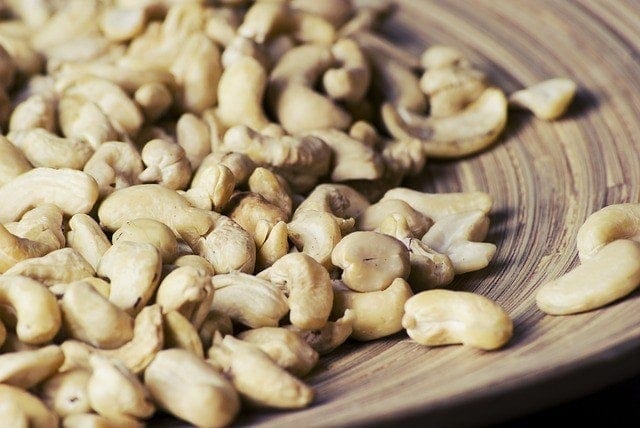
You might notice that certain types of commercial hamster food include small amounts of nuts along with seeds and dried fruits. You might also notice that cashews are never in the formulas that include nuts. So, this may naturally lead you to wonder whether it’s safe for hamsters to eat cashews. Are they poisonous to hamsters?
The truth is that hamsters can eat cashews but not as a part of their regular diet. Instead, cashews should be offered in moderation. Here’s what you should know about feeding cashews to your hamster.
Hamsters Can Eat Cashews But Only Sparingly
Cashews are not poisonous to hamsters in any way. In fact, there are health benefits of cashews that hamsters can take advantage of throughout their lives. The nuts are a great source of magnesium, copper, and other minerals that are needed for a healthy immune system and strong mind. They also happen to be a decent source of fiber, protein, and healthy fats. However, there are certain issues that cashews can create for your hamster if they’re eaten too often.
These tasty nuts are high in calories. About 18 cashews (1 ounce worth) contain more than 150 calories. So, if a hamster eats cashews regularly (even just one a day), it could lead to problems like obesity, diabetes, and heart disease. Therefore, the caveat to feeding a cashew to your hamster is that you should do so sparingly, as an occasional treat or reward, not a regular part of their daily diet. If your hamster already has any medical problems, especially those attributed to being overweight, it’s a good idea to skip the cashews altogether.
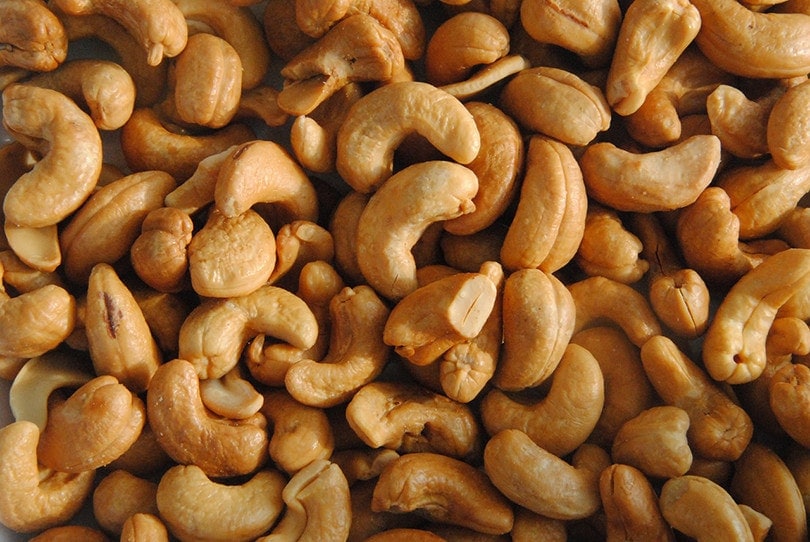
FAQ
Can Hamsters Eat Salted or Flavored Cashews?
It’s not a good idea to give salted or flavored cashews to your hamster. The added salt equals nothing more than unnecessary sodium for the little rodent. Also, an ingredient that is toxic to them or too spicy might be lurking within flavored cashews. Therefore, always skip salted and flavored cashews, and opt for plain, unsalted roasted cashews instead. If all you have are salted or flavored cashews, choose another type of treat for your hammy, such as a berry or a piece of a whole-grain cracker.
Can Hamsters Eat Raw Cashews?
Raw cashews, fresh from the tree, may contain a chemical called urushiol, which is the same substance found in poison ivy. Urushiol can cause skin reactions, and even be toxic if eaten by our tiny friends. However, most cashews sold in stores have been boiled, removing this chemical. Never feed your hamster cashews in the shell, and if you want to play it completely safe, stick to roasted.
How Often and How Many Cashews Should a Hamster Eat?
While hamsters should eat cashews only occasionally as treats, there is no specific formula to follow when feeding them to your hamster. That said, you shouldn’t offer any more than one cashew a week. You can offer an entire cashew at once or cut it into pieces and serve them as treats more often throughout the week. If you’re in doubt, contact your veterinarian for expert advice and feeding guidance.
Because all nuts are high in fat, you should avoid feeding your hamster any muesli-like foods that contain fruits and nuts. The likelihood is that they will pick out all the ‘good’ bits, and leave the nutritional stuff behind. Keep fruits and nuts as a treat, not as part of their daily diet.
What Are Other Things to Consider When Feeding Cashews to Your Hamster?
You may want to maintain a snack diary for your hamster so you can keep track of everything that they eat that isn’t a part of their regular diet. This will help ensure that they aren’t indulging in foods like cashews too often for their own good. If you’re feeding cashews to your hamster every week, you shouldn’t also be feeding them other nuts.
It’s a good idea to mix things up and offer a different kind of nut every other week or so. This will help ensure that your hamster is getting all the nutrients that they need to stay healthy, strong, and happy throughout their life. If your hamster has never eaten cashews before, introduce the food to them slowly to ensure that it won’t give them an upset stomach or cause problems like lethargy.
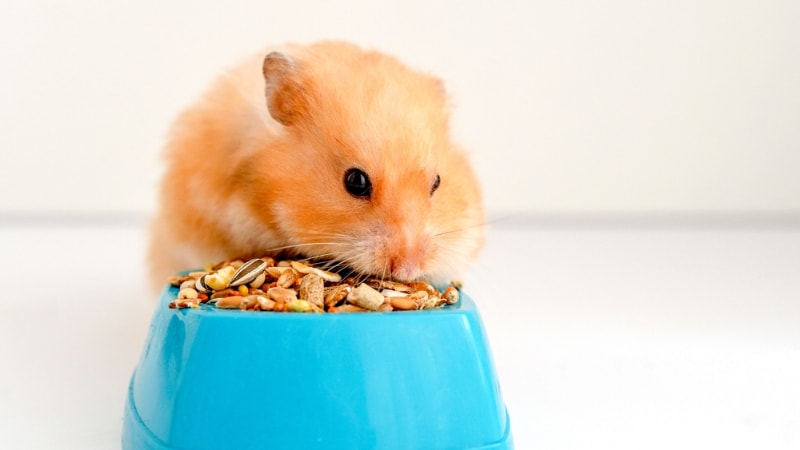
What Other Nuts Can Hamsters Eat?
Although nuts wouldn’t normally be part of a wild hamster diet, they are certainly something that most will love to eat, and the good news is that almost all nuts are safe for your hamster to enjoy, but there are a few things to be aware of.
- Almonds – never feed your hamster – or anyone – bitter almonds. They are toxic
- Peanuts – boiled or roasted are best to avoid any mold in the shell
- Walnuts and pecans – these are both prone to growing fungus that can be toxic, although this is possible with all nuts. Be sure to remove any uneaten nut pieces from your hammy’s home within a day or two.
- Nuts with hard shells (eg. hazelnuts, walnuts) can damage your hamster’s teeth, so either remove the shell entirely, or crack the shell open so they can enjoy getting to the nut inside safely
Final Thoughts
Cashews are safe occasional treats for hamsters, but not all hamsters enjoy these nuts. If your hamster doesn’t show any interest in cashews, you can try another type of nut that is safe for them. If they love cashews, that’s great! Just make sure moderation is always kept in mind. Too much fat in a hamster’s diet can cause health problems in the long run. If you find that cashews are making your hamster gain weight, cut back on how many you’re giving them, or skip them altogether in favor of lower-calorie, lower-fat options.
Featured Image Credit: tookapic, Pixabay


